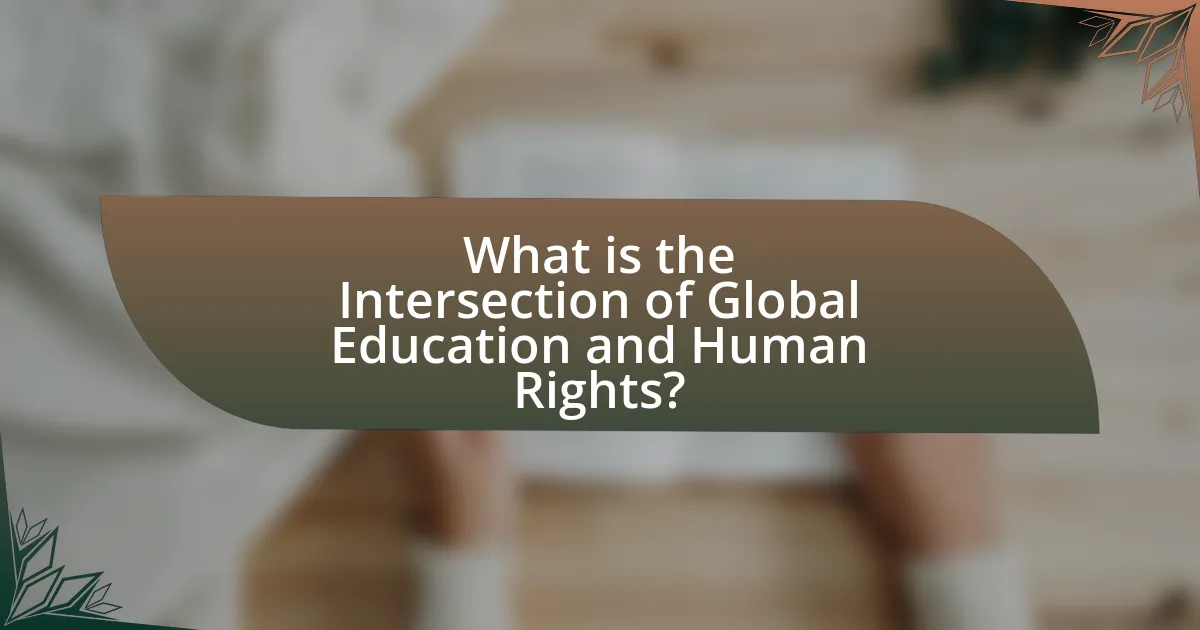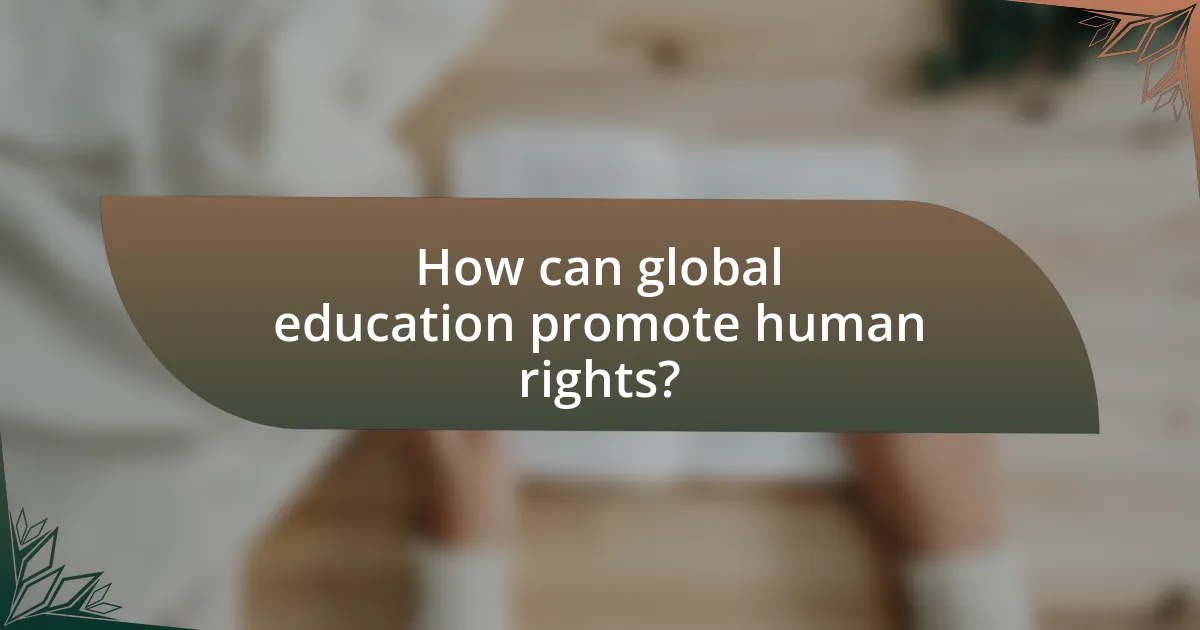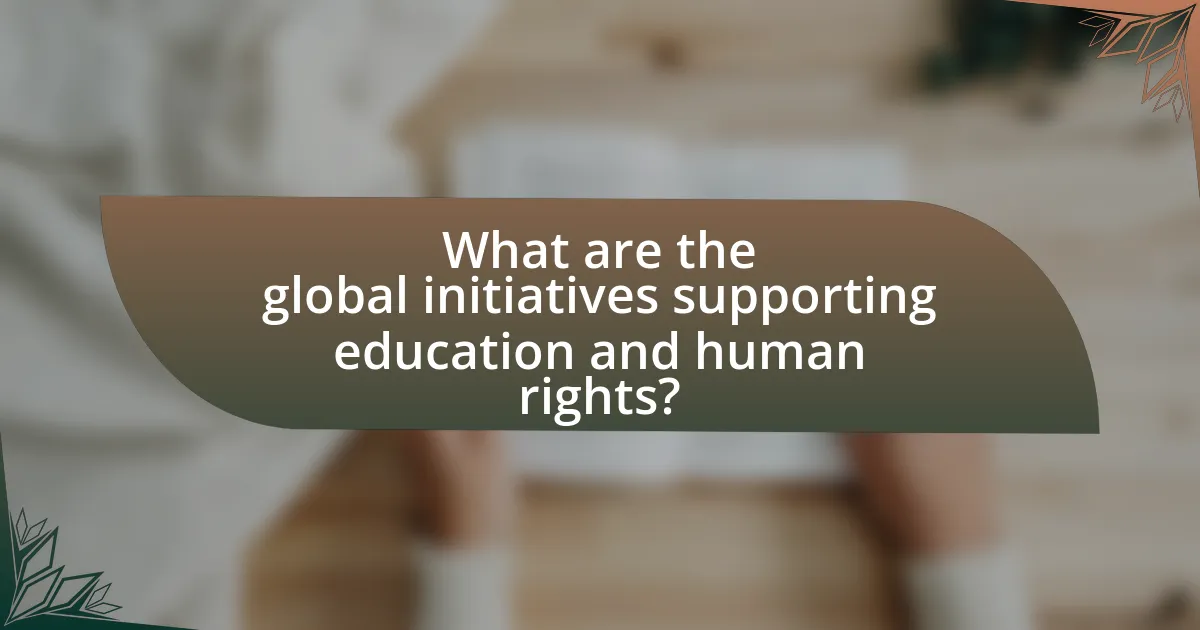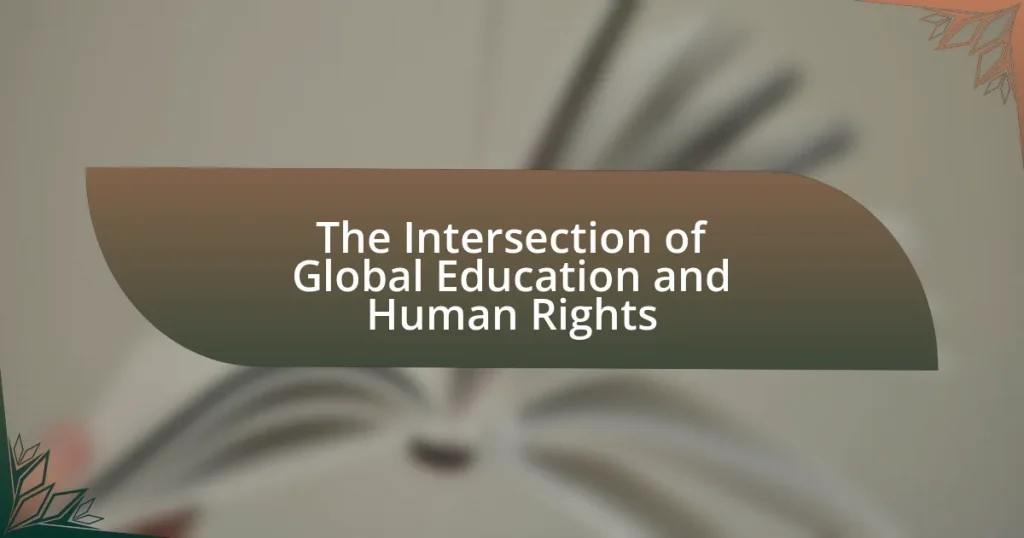The article examines the critical intersection of global education and human rights, emphasizing that access to quality education is a fundamental human right essential for individual and societal development. It highlights the principles of inclusivity, sustainability, and critical thinking in global education, while discussing key human rights relevant to education, such as the right to free and compulsory primary education. The article also addresses the challenges faced in achieving educational equity, including access inequality and cultural barriers, and outlines the role of international treaties and organizations in promoting education as a human right. Furthermore, it explores strategies for enhancing human rights education and the impact of integrating these principles into educational curricula, ultimately advocating for community involvement and advocacy to advance education and human rights globally.

What is the Intersection of Global Education and Human Rights?
The intersection of global education and human rights lies in the recognition that access to quality education is a fundamental human right essential for the development of individuals and societies. The Universal Declaration of Human Rights, adopted by the United Nations in 1948, explicitly states in Article 26 that everyone has the right to education, which underscores the importance of education in promoting human dignity, freedom, and equality. Furthermore, global initiatives such as the Sustainable Development Goals emphasize the need for inclusive and equitable quality education as a means to empower individuals and reduce inequalities, thereby reinforcing the connection between education and the realization of human rights.
How do global education and human rights relate to each other?
Global education and human rights are intrinsically linked, as education is recognized as a fundamental human right essential for the realization of other rights. The Universal Declaration of Human Rights, adopted by the United Nations in 1948, states in Article 26 that everyone has the right to education, which promotes individual freedom and empowerment. Access to quality education enables individuals to understand and advocate for their rights, fostering informed citizenship and social justice. Furthermore, global education initiatives aim to address inequalities and promote inclusive education, aligning with the principles of human rights by ensuring that marginalized groups, such as girls and children with disabilities, receive equal educational opportunities. This relationship underscores the importance of education in advancing human rights and social equity on a global scale.
What are the fundamental principles of global education?
The fundamental principles of global education include inclusivity, sustainability, and critical thinking. Inclusivity ensures that education is accessible to all individuals, regardless of their background, promoting equality and social justice. Sustainability emphasizes the need for education to address global challenges such as climate change and resource depletion, preparing learners to contribute to a sustainable future. Critical thinking encourages students to analyze and question information, fostering informed citizenship and active participation in democratic processes. These principles are supported by international frameworks like the United Nations Sustainable Development Goals, which advocate for quality education and lifelong learning opportunities for all.
What are the key human rights relevant to education?
The key human rights relevant to education include the right to free and compulsory primary education, the right to non-discrimination in education, and the right to access quality education. The Universal Declaration of Human Rights (Article 26) states that everyone has the right to education, which should be free at least in the elementary and fundamental stages. Additionally, the Convention on the Rights of the Child emphasizes the right to education without discrimination of any kind, ensuring that all children have equal access to educational opportunities. Furthermore, the International Covenant on Economic, Social and Cultural Rights (Article 13) highlights the importance of education being directed to the full development of the human personality and the strengthening of respect for human rights and fundamental freedoms.
Why is the intersection of global education and human rights important?
The intersection of global education and human rights is important because education is a fundamental human right that empowers individuals and promotes social justice. Access to quality education enables people to develop critical thinking skills, participate in civic life, and improve their economic conditions. According to the Universal Declaration of Human Rights, Article 26 states that everyone has the right to education, which underscores its significance in fostering equality and dignity. Furthermore, the Global Education Monitoring Report by UNESCO highlights that education is essential for achieving other human rights, such as the right to work and the right to health, demonstrating its integral role in advancing human rights globally.
How does education contribute to the realization of human rights?
Education contributes to the realization of human rights by empowering individuals with knowledge and skills necessary to advocate for their rights and the rights of others. It fosters critical thinking, enabling people to understand their rights and the mechanisms available for their protection. For instance, the United Nations Educational, Scientific and Cultural Organization (UNESCO) emphasizes that education promotes awareness of human rights principles, which is essential for fostering a culture of respect and equality. Furthermore, studies show that educated individuals are more likely to participate in civic activities, thereby strengthening democratic processes and accountability, which are fundamental to human rights.
What role do human rights play in shaping educational policies?
Human rights play a crucial role in shaping educational policies by establishing fundamental principles that ensure access to quality education for all individuals. These principles are often enshrined in international agreements, such as the Universal Declaration of Human Rights, which asserts that everyone has the right to education. This legal framework compels governments to create inclusive educational systems that respect diversity and promote equality, thereby influencing national policies and practices. For instance, countries that ratify the Convention on the Rights of the Child are obligated to prioritize education as a right, leading to policies that aim to eliminate barriers to education, such as discrimination based on gender, disability, or socioeconomic status.
What challenges exist at the intersection of global education and human rights?
Challenges at the intersection of global education and human rights include access inequality, cultural barriers, and systemic discrimination. Access inequality manifests in disparities in educational opportunities based on socioeconomic status, gender, and geographic location, with UNESCO reporting that 258 million children and youth are out of school globally. Cultural barriers often hinder the inclusion of marginalized groups, such as ethnic minorities and refugees, in educational systems, leading to violations of their right to education. Systemic discrimination can occur within educational policies and practices, perpetuating cycles of disadvantage and limiting the realization of human rights for vulnerable populations.
What barriers prevent access to quality education worldwide?
Barriers that prevent access to quality education worldwide include poverty, lack of infrastructure, cultural norms, and political instability. Poverty affects families’ ability to afford school fees, uniforms, and supplies, leading to high dropout rates; for instance, UNESCO estimates that 258 million children and youth are out of school due to financial constraints. Lack of infrastructure, such as inadequate school facilities and transportation, further hinders access, particularly in rural areas where schools may be far away. Cultural norms, including gender discrimination, can restrict educational opportunities for girls, as evidenced by the fact that 130 million girls worldwide are out of school. Political instability and conflict disrupt education systems, with UNICEF reporting that over 75 million children are in need of educational support in crisis-affected countries. These factors collectively create significant obstacles to achieving quality education for all.
How do cultural and political factors impact educational human rights?
Cultural and political factors significantly impact educational human rights by shaping policies, access, and societal attitudes towards education. For instance, in countries where cultural norms prioritize certain groups over others, such as gender or ethnicity, educational opportunities may be restricted, leading to disparities in access to quality education. Politically, regimes that suppress dissent or prioritize authoritarian governance often limit educational freedoms, as seen in nations with strict censorship and control over curricula. According to UNESCO, over 260 million children worldwide are out of school, with cultural and political barriers being primary contributors to this issue. These barriers not only hinder individual rights to education but also perpetuate cycles of poverty and inequality, demonstrating the profound influence of cultural and political contexts on educational human rights.

How can global education promote human rights?
Global education can promote human rights by fostering awareness and understanding of human rights issues across diverse cultures and societies. This educational approach equips individuals with the knowledge to recognize, advocate for, and uphold human rights standards. For instance, UNESCO emphasizes that education is a fundamental human right and plays a crucial role in empowering individuals to challenge injustices and discrimination. Furthermore, studies show that countries with comprehensive human rights education programs report higher levels of civic engagement and social responsibility among their citizens, leading to stronger advocacy for human rights protections.
What strategies can be implemented to enhance human rights education?
To enhance human rights education, integrating experiential learning strategies is essential. Experiential learning, such as simulations, role-playing, and community engagement, allows learners to actively participate in human rights scenarios, fostering empathy and understanding. Research indicates that programs incorporating experiential learning significantly improve students’ awareness and commitment to human rights issues, as evidenced by a study conducted by the United Nations Educational, Scientific and Cultural Organization (UNESCO) which found that students engaged in such activities demonstrated a 30% increase in knowledge retention regarding human rights principles. Additionally, incorporating diverse perspectives through multicultural curricula can broaden understanding and appreciation of global human rights challenges, further enhancing educational outcomes.
How can curricula be designed to include human rights education?
Curricula can be designed to include human rights education by integrating human rights principles across various subjects and promoting critical thinking about social justice issues. This approach can involve developing specific modules that focus on the Universal Declaration of Human Rights and its implications, as well as incorporating case studies that highlight human rights violations and successes globally. Research indicates that educational programs that emphasize experiential learning, such as simulations and role-playing, enhance students’ understanding of human rights concepts and their application in real-world scenarios. For instance, the Council of Europe’s Charter on Education for Democratic Citizenship and Human Rights Education provides a framework that supports the inclusion of human rights education in school curricula, demonstrating its effectiveness in fostering a culture of respect and responsibility among students.
What role do educators play in promoting human rights?
Educators play a crucial role in promoting human rights by fostering awareness, understanding, and advocacy among students. They integrate human rights education into curricula, helping students recognize their rights and the rights of others, which is essential for cultivating a culture of respect and equality. Research indicates that education significantly influences attitudes towards human rights; for instance, a study by the United Nations Educational, Scientific and Cultural Organization (UNESCO) found that human rights education enhances students’ critical thinking and empathy, leading to increased civic engagement. By equipping students with knowledge and skills, educators empower them to challenge injustices and advocate for their rights and the rights of marginalized communities.
What are the benefits of integrating human rights into global education?
Integrating human rights into global education fosters critical thinking, promotes social justice, and enhances global citizenship. By embedding human rights principles in educational curricula, students develop an understanding of their rights and responsibilities, which empowers them to advocate for themselves and others. Research indicates that education focused on human rights can lead to increased awareness of social issues, as evidenced by a study from the United Nations Educational, Scientific and Cultural Organization (UNESCO), which found that students exposed to human rights education are more likely to engage in civic activities and contribute positively to their communities. Furthermore, this integration helps cultivate respect for diversity and encourages dialogue, which is essential in a globalized world.
How does this integration foster social justice and equality?
This integration fosters social justice and equality by promoting equitable access to education for marginalized communities. Global education initiatives often emphasize human rights, ensuring that all individuals, regardless of their background, have the opportunity to learn and thrive. For instance, UNESCO reports that inclusive education policies can significantly reduce disparities in educational attainment, thereby empowering disadvantaged groups and contributing to social equity. By aligning educational frameworks with human rights principles, this integration actively works to dismantle systemic barriers and create a more just society.
What impact does it have on students’ civic engagement?
Global education significantly enhances students’ civic engagement by fostering awareness of social issues and encouraging active participation in democratic processes. Research indicates that students exposed to global education curricula demonstrate higher levels of civic knowledge and are more likely to engage in community service and advocacy. For instance, a study by the Center for Global Education found that students who participated in global education programs were 50% more likely to vote and engage in civic activities compared to their peers who did not receive such education. This correlation underscores the role of global education in shaping informed, active citizens who contribute positively to their communities and society at large.

What are the global initiatives supporting education and human rights?
Global initiatives supporting education and human rights include the United Nations Sustainable Development Goal 4, which aims to ensure inclusive and equitable quality education for all. This initiative emphasizes the importance of education as a fundamental human right and seeks to promote lifelong learning opportunities. Additionally, the Global Partnership for Education mobilizes funding and resources to improve education systems in developing countries, directly linking education to human rights by advocating for access to quality education for marginalized groups. The Universal Declaration of Human Rights, adopted by the UN in 1948, also underscores the right to education, affirming that everyone has the right to education and that education should be directed to the full development of the human personality. These initiatives collectively reinforce the critical connection between education and the realization of human rights globally.
What organizations are leading efforts in this intersection?
Organizations leading efforts at the intersection of global education and human rights include UNESCO, Human Rights Watch, and Save the Children. UNESCO promotes education as a fundamental human right and works to ensure inclusive and equitable quality education for all. Human Rights Watch advocates for the protection of children’s rights to education, particularly in conflict zones. Save the Children focuses on ensuring that children have access to education, especially in emergencies, highlighting the importance of education in safeguarding human rights. These organizations are recognized for their impactful initiatives and advocacy in this critical area.
How do international treaties support education as a human right?
International treaties support education as a human right by establishing legal frameworks that obligate countries to ensure access to quality education for all individuals. For instance, the Universal Declaration of Human Rights (1948) explicitly states in Article 26 that everyone has the right to education, which sets a global standard for educational access. Additionally, the International Covenant on Economic, Social and Cultural Rights (1966) further reinforces this by obligating signatory states to take steps to achieve the full realization of the right to education, emphasizing availability, accessibility, acceptability, and adaptability of education systems. These treaties create accountability mechanisms, encouraging nations to implement policies that promote inclusive and equitable education, thereby affirming education as a fundamental human right.
What role does the United Nations play in promoting education and human rights?
The United Nations plays a crucial role in promoting education and human rights by establishing international standards and frameworks that guide member states in their educational policies and human rights practices. Through initiatives like the Universal Declaration of Human Rights and the Sustainable Development Goals, particularly Goal 4, the UN emphasizes the right to quality education for all, which is essential for the realization of other human rights. The UN also conducts monitoring and reporting on educational access and quality, providing data and recommendations to improve educational systems globally, thereby reinforcing the link between education and the protection of human rights.
How can individuals contribute to the advancement of education and human rights?
Individuals can contribute to the advancement of education and human rights by actively participating in advocacy, volunteering, and supporting educational initiatives. Advocacy efforts can include raising awareness about educational disparities and human rights violations, which can influence policy changes and funding allocations. Volunteering in local schools or organizations focused on education can directly impact students’ learning experiences and promote inclusive practices. Supporting educational initiatives, such as donating to charities that provide resources for underprivileged communities, can help bridge the gap in access to quality education. According to UNESCO, education is a fundamental human right that empowers individuals and promotes social justice, highlighting the importance of individual contributions in this area.
What actions can be taken at the community level?
Communities can implement educational programs that promote human rights awareness and advocacy. These programs can include workshops, seminars, and community discussions that educate members about their rights and the importance of global education. For instance, according to the United Nations Educational, Scientific and Cultural Organization (UNESCO), education is a fundamental human right that empowers individuals and fosters social cohesion. By organizing local events that focus on human rights education, communities can enhance understanding and encourage active participation in human rights initiatives.
How can advocacy and awareness campaigns make a difference?
Advocacy and awareness campaigns can make a significant difference by mobilizing public support and influencing policy changes. These campaigns raise awareness about critical issues, such as human rights violations and educational disparities, thereby educating the public and policymakers. For instance, the Global Campaign for Education has successfully advocated for increased funding for education in developing countries, resulting in a 20% increase in educational budgets in several nations. This demonstrates that targeted campaigns can lead to tangible improvements in access to education and the protection of human rights.
What best practices can be adopted to ensure effective education and human rights integration?
To ensure effective education and human rights integration, adopting a rights-based approach in educational policies and practices is essential. This approach emphasizes the importance of embedding human rights principles, such as equality, non-discrimination, and participation, into the curriculum and teaching methods. For instance, the United Nations Educational, Scientific and Cultural Organization (UNESCO) advocates for integrating human rights education into school systems, which has been shown to enhance students’ understanding of their rights and responsibilities. Additionally, training educators on human rights issues equips them to foster an inclusive environment that respects diversity and promotes social justice. Research indicates that countries implementing these practices, such as Finland, have seen improved educational outcomes and a stronger commitment to human rights among students.
